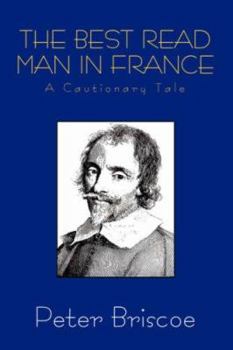The Best Read Man in France
No Synopsis Available.
Format:Paperback
Language:English
ISBN:1434400808
ISBN13:9781434400802
Release Date:October 2007
Publisher:Borgo Press
Length:119 Pages
Weight:0.41 lbs.
Dimensions:0.3" x 9.0" x 6.0"
Customer Reviews
3 ratings
Savor The Best Read Man in France
Published by Thriftbooks.com User , 17 years ago
Savor The Best Read Man in France, for as you ruminate, this morsel of prose offers more than its length suggests. The perfect repast for a leisurely afternoon, this tidy novella (111 pages) lovingly maps the social geography of books by following the travels and travails of a dauntless bookseller in Los Angeles, Paris and Mexico City. As our handsome hero--alternately a hardworking librero and a passionate connoisseur of much more than books--unearths the tragic story of the man behind the great people's library circa 1645 in France, he discovers that his own steamy flirtations with a lovely, digital librarian court more than merely individual ruin. Rather, like his symbolic forbear, he must summon desire, taste, sense and reason to save the great enterprise itself! In sum, we hope this author's first fiction, a lively, entertaining caution to booklovers everywhere, is an aperitif, whetting the appetite for future, longer literary feasts. Thus we highly recommend you take the "best read man," a delightful companion of just the right proportions, aboard your next transcontinental or transoceanic flight!
A book lover's book
Published by Thriftbooks.com User , 17 years ago
This is a wonderful story for people who love books. Peter Briscoe deftly captures what may be a vanishing culture of associations surrounding the creation of great library collections--the texture of the human relations between professional booksellers and acquisitions librarians, based on shared assumptions of the need to promote excellence in scholarship. A telling example appears early on, when bookdealer and protagonist Michael Ashe, having looked for a gap in the holdings of the Institute des Hautes Etudes de l'Amerique Latine in Paris, offers its conservator a copy of Anita Brenner's 1943 _The Wind That Swept Mexico_ simply as a donation, not a sale, "to perfect the collection." It is that ineffable element of artistic endeavor, of bringing about a "whole" with parts integrated by human aspiration, expertise, perseverance, and choice, that Briscoe captures wonderfully, with a true insider's eye for the details and customs of the international book trade. The novel has an elegaic tone, however; it arises from Ashe's having more and more to deal with a changed worldview in the libraries (and the librarians running them) for which he scouts out the obscure, the unique, and the out-of-the-way volumes that become important--sometimes remarkably so--only when associated with other such items in carefully tended collections. The new library mindset that Ashe finds himself confronted by is no longer one of desiderata and lacunae, but of batch processing and blanker orders--producing collections different in both content and coherence from the "wholes" crafted by scholars who actually read and understand what they are acquiring. "Now many libraries were poised to take the next step: to stop buying printed books entirely, except as museum objects for special collections, the occasional 'show book.'" Asked at one point how the book business is, Ashe replies, ruefully, "In a steady decline, due to an obsession with electronics and a conviction that the computer will replace the book. There is still money but it has been shifted to new interests." And those new interests are more concerned with digitizing than collecting preservable paper copies; at one dinner in the novel, the architect of a new academic library, "trying to be funny, promised that the only paper to be found in the new library would be in printers and toilet stalls." What dismays Ashe (and Briscoe) most is the new and growing obliviousness in the library profession to the craft of "perfecting" what they do. The "best read man" of the title refers to Gabriel Naude, the librarian of Cardinal Mazarin in mid-17th century France, who, Ashe discovers during his researches, assembled a collection of some 40,000 books and manuscripts--three times the size of Europe's next largest library, the Bodleian. Naude, too (like Ashe) then saw his life's work being dismantled before his very eyes: when Mazarin lost political power, the greatest library in the world was dispersed to the winds
The Librarian as Artist
Published by Thriftbooks.com User , 17 years ago
Peter Briscoe's Best Read Man in France joins a fine collection of works that are encyclopedic, because the creators exhibit a vast knowledge and erudition, and the joy of reading and knowledge for their own sakes. I am thinking of Poe's Marginalia, Huysmans' A rebours, Jorge Luis Borges' The Library of Babel, and many other works. Briscoe's novel depicts the character of Michael Ashe, an itinerant, knowledgeable bookseller most sympathetically, a solitary man, an international traveler. To enhance characterization, the novel dwells lovingly on books (as characters, I would say)--their titles, in several languages, with bibliographic information, and their international importance. Michael's amorous relationship with four women--Elise, Irena, Elizabeth, and María contain delicate depictions of sensuality and erotic experience. I value highly the Parisian sense of place, the culinary details, and the distinctly international quality of this book. It is so Latin American, so French and international in the most positive sense of the word, written by a learned American, a former librarian who long ago joined the ranks of writers with a translation of a novel from French to English, and publication of an outstanding book of essays that brings to mind Francis Bacon--Reading the Book of Knowledge. This is a novel that will bring pleasure to all who read it. Written by a former librarian I recommend it most highly. Eliud Martínez, novelist





